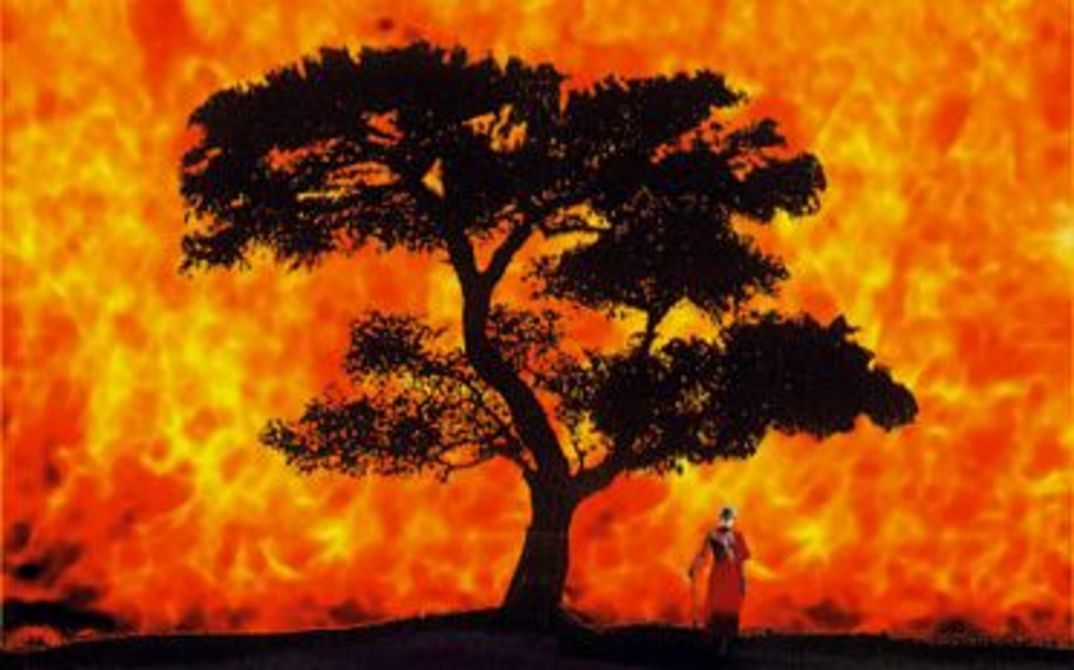PO DI SANGUI, Flora Gomes, Guinea-Bissau 1996, OV/GeS, 95 min
In the village where PO DI SANGUI takes place, the essential opposition of our being, the one life-affirming, the other life-threatening, cross paths. In Amanha Lundju a tree is planted at every birth. This tree grows up with the child, growing even taller, surviving the child and becoming his or her soul. When Dou returns to the village after a long absence, he finds out that his twin brother Hami has died. While Dou's own tree is wasting away, his dead brother's tree is strong and teeming with life. Its sap is blood red: a blood tree (po di sangui) that becomes a silent advisor to Dou.
Flora Gomes's visually gripping narrative not only contains a mysticism that is seemingly timeless, it is also charged with a dense subtext of cultural and political connotations. It's about ecological and social questions such as the threat of water shortage, the depletion of tropical timber, and the emigration of the young generation, but also about the still palpable repercussions of the long struggle for independence from Portuguese colonialism. The exodus, which the village community eventually decides on, becomes an emblem, not as the solution to the problem, but as a necessary passage into a still open future. LA PETITE VENDEUSE DE SOLEIL (The Little Girl Who Sold the Sun), Djibril Diop Mambéty, Senegal 1999, OV/GeS 41 min
LA PETITE VENDEUSE DE SOLEIL: In Dakar, selling newspapers on the street is actually always done by boys, but Sili challenges that exclusive rule. She's perhaps twelve or thirteen years old, walks with a limp, and lives with her blind grandmother, who goes into the city with her each day to beg. After a bad clash with the gang of paperboys, she decides not to put up with such attacks and, despite all the hardships, to become a salesgirl for the pro-government paper Le Soleil.
Mambéty's last film LA PETITE VENDEUSE DE SOLEIL is the second part of an uncompleted trilogy on the “history of the little people” (histoire des petites gens). LA PETITE VENDEUSE DE SOLEIL was finished after Mambéty's death in 1998 under the direction of the Swiss producer Silvia Voser. The film is joyful and poignant, full of eccentric characters, and provides a vision of great happiness in the midst of complete desperation. LA PETITE VENDEUSE DE SOLEIL is permeated with music – which is the story, narrative, and elixir of life and is the focus of an analytical kind of filmmaking that works with ambiguity at all levels and cultivates small intersections of various narrative strands. But LA PETITE VENDEUSE DE SOLEIL is also a film about the future, that of the little salesgirl, and also that of the other children, of the stunted and shriveled; a future in which wisdom and madness lay side by side, and in which it takes a lot of wit and bravery to live with any respect. More information on Visionary Archive / It all depends

Visionary Archive: It all depends #5 Our guest is Flora Gomes
Flora Gomes’sensationalfeature film debut"Mortu Nega" (1988) was long considered considered the beginning of cinema in Guinea-Bissau, and the director has remained one of the industry's most important actors. His early work as a documentarist of the Guinean liberation struggle is less known - it is a collective film oeuvre interwoven with the decolonization process that has come back into focus thanks to Arsenal's"Visionary Archive"project. (Forum Expanded panel at the Berlinale on 11.2). The cinema evening on 17.2 gives an opportunity to see and discuss two films with Flora Gomes: his feature film PO DI SANGUI (1996) about an exodus from a drought-threatened village community, and the last film by the Senegalese visionary of cinema Djibril Diop Mambéty - LA PETITE VENDEUSE DE SOLEIL (1999). (mhg, th) (17.2.)


